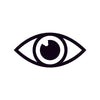It may seem as though all you need to do in an eye exam is read letters on the chart. To ensure the exam is best tailored to you, here are a few things you can prepare.
What are your concerns?
Raise any specific concerns you have at the start of the eye exam so your optometrist can tailor the exam to you. Capture any concerns and questions on a small piece of paper so you can remember them.
What to bring:
-
Your most recent spectacles, or a packet of your contact lenses. Bring your most recent glasses. If you are a contact lens wearer, also bring the packet in which your contact lenses were enclosed. To ensure that the change or update in prescription will not cause dizziness or discomfort, most glasses prescribed by your optometrist are based on what you have been used to wearing before. There are exceptions to the rule, including lost spectacles, recent refractive surgeries, or recent-onset discomfort with your usual spectacles/contact lenses.
-
Medicare Card, Health Fund Card
Bring them along, so we can help you claim your Medicare on the spot after the eye exam. If you have a private health fund, your health fund card is required if you purchase any glasses and want to claim your rebate on the day.
-
Any eye drops you have been using: This is especially the case if your eye(s) are red, uncomfortable or in pain.


